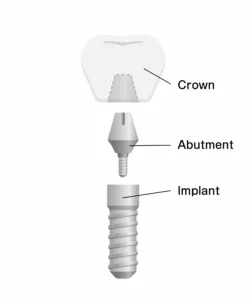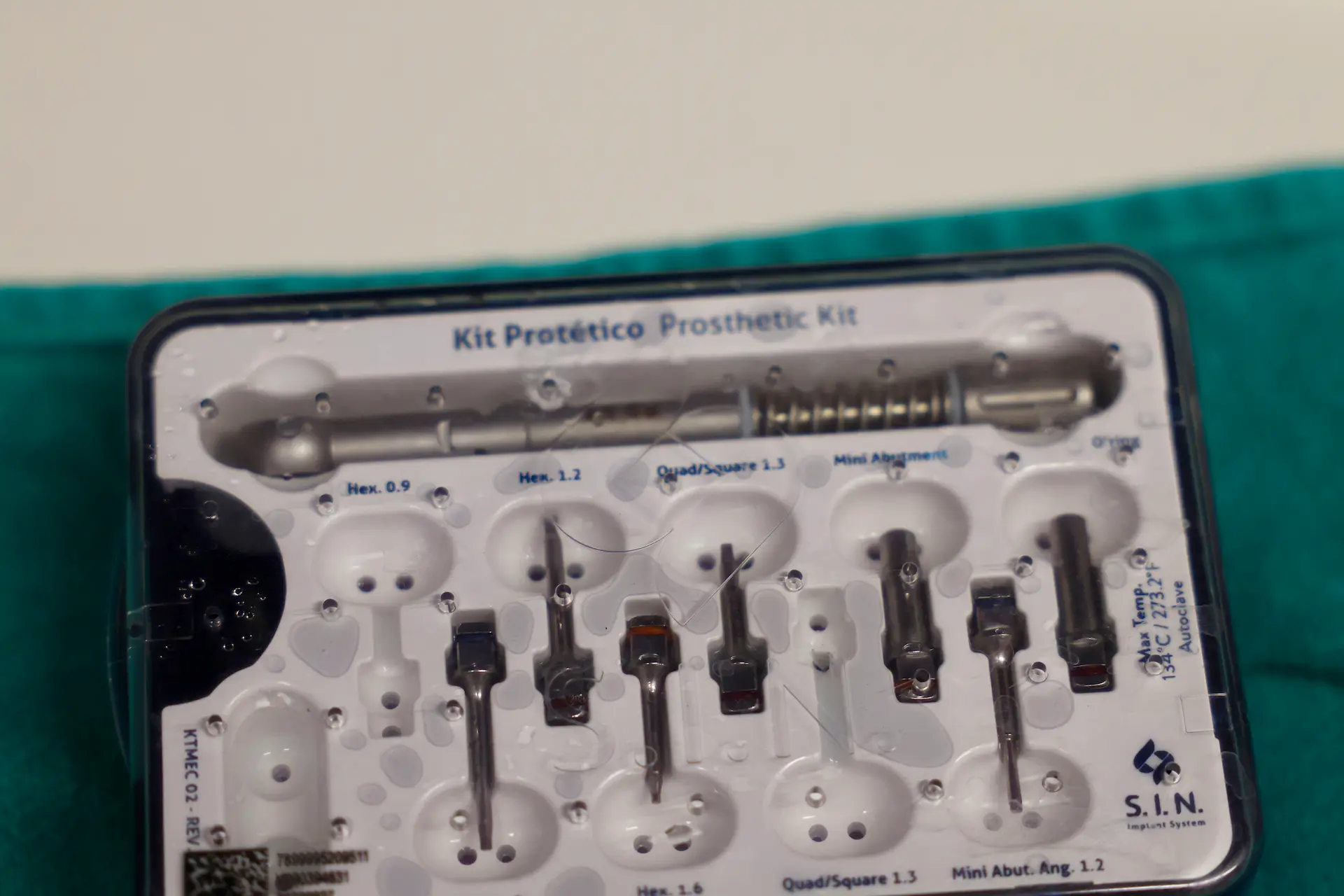Are you considering dental implants? If so, you’ve likely heard about dental abutments and are wondering what they are.
A dental abutment is a small part that connects the implant to the final tooth restoration. The dental implant procedure involves several steps. It starts with a consultation to check your oral health. Next, our oral surgeon places the implant in your jawbone. After that, they attach the abutment. Finally, a crown goes on top. This secure connection ensures the implant works well.
Keep reading to understand more about dental implant abutments.
What is a Dental Implant Abutment?
An abutment is a metal connector that we place onto your dental implant. The abutment screws into the implant and holds your crown (your new tooth) securely in place. If you have a dental bridge, crowns are placed on two abutments connected by other replacement teeth.
Abutments are usually made in a dental lab from materials like zirconia, titanium, gold, and stainless steel. Placing the abutment is a minor procedure, and it is often done at NuSet under IV sedation so you won’t feel any pain.
There are two types of dental implant abutments, and we will discuss them below.
Stock Abutments vs. Custom Abutments
| Stock Abutments | Custom Abutments |
| Pre-made, readily available | Made specifically for the patient |
| Affordable | Can be slightly more expensive |
| It may not fit perfectly | Designed for a perfect fit |
| Standard look | Matches dental anatomy |
Stock abutments are pre-made and readily available and can be used immediately without customization. They can be more affordable but may not fit perfectly with your unique dental anatomy.
Custom abutments, on the other hand, are made specifically for you. They are designed to match your dental structure perfectly and provide a better fit and appearance. Custom abutments are more of an investment but offer excellent results.
Abutments can be made from the following materials:
- Titanium
- Gold
- Stainless Steel
- Zirconia
- Polyether Ether Ketone (PEEK)
Titanium is the most commonly used material for abutments because of its strength and compatibility with the body. Zirconia is gaining popularity due to its natural-looking appearance and higher resistance to wear. Both materials are safe to use in the mouth as they are hypoallergenic and biocompatible.

The Importance of a Dental Implant Abutment
A dental implant abutment is an important part of the dental implant process as it connects the implant to the dental crown. Without the abutment, attaching the crown to the implant would be impossible.
Here’s why dental implant abutment is super important:
- It connects the implant to the crown.
- It keeps the crown stable and secure.
- It provides a strong foundation for the crown.
- It is made from a material that won’t cause reactions in the body.
The Process of Placing a Dental Implant Abutment at NuSet Dental Implants and Oral Surgery
At NuSet, we make sure every step of placing a dental implant abutment is smooth and effective. Here’s how we do it:
Healing Period
After placing the implant in your jawbone, we allow time for healing. This process, which can take 3-6 months, ensures the implant fuses properly with your bone. We monitor your progress closely during this period to ensure optimal healing. Also, we don’t just leave a gap in your mouth. We provide you with a temporary tooth so that you can have a complete smile while you wait.
Placing the Abutment
After the healing period, we take out the temporary tooth or teeth. We then screw the abutment into the implant. This serves as a base for your new tooth. Our precision and care during this step ensure that the abutment is securely placed and provides a strong foundation for the crown.
Healing Cap
A healing cap is placed on the abutment to prevent gum tissue from growing over it. This also helps shape the gum tissue around the abutment, ensuring a natural look. Our team will provide you with detailed care instructions to promote healing during this phase.
Final Restoration
After the gum heals, we remove the healing cap and place the crown or bridge on the abutment. This completes your dental restoration. Our skilled professionals customize the crown to match the color and shape of your natural teeth.
Our skilled professionals at NuSet Dental Implant Center make sure your dental implant process is successful and stress-free. We use the latest technology and techniques to restore your smile with expertise and care, giving you the confidence and comfort you deserve.
How to Maintain and Care for Dental Implant Abutments
Proper care of your dental implant abutment is vital for its longevity and health. Here’s how you can maintain and care for it effectively.
Daily Oral Hygiene Practices
Brush your teeth at least twice a day. Use a soft-bristle toothbrush and non-abrasive toothpaste to clean around the implant and abutment.
Use a Waterpik daily to remove food particles and plaque from between your teeth and around the abutment. This is a safer alternative to regular flossing for dental implants.
Use an antimicrobial mouthwash to reduce bacteria and keep your mouth clean. Rinsing helps prevent infections around the implant.
Regular Dental Check-ups and Professional Cleanings
Visit us regularly for check-ups. We will monitor the condition of your implant and abutment to make sure everything is in good shape.
Schedule professional cleanings to remove any plaque or tartar that may have built up around your implant. These cleanings help maintain the health of your implant and surrounding gums.
Taking these steps will help ensure your dental implant abutment remains in good condition, supporting its longevity and overall oral health.
Visit NuSet for Expert Dental Implant Care
Taking care of your dental implant abutment is essential for its success. At NuSet Dental Implants and Oral Surgery, we provide expert guidance and care throughout the entire dental implant process, from consultation to final restoration and beyond.
If you’re considering dental implants or need professional advice on maintaining your implants, our skilled team is here to help. Schedule a consultation with us today to ensure the health and longevity of your smile.
Frequently Asked Questions
What is the difference between a dental implant and an abutment?
A dental implant is a metal or ceramic post surgically placed into the jawbone to act as a root for a missing tooth. An abutment is a connector placed on top of the implant to hold and support the crown or bridge.
How long does a dental implant abutment last?
A dental implant abutment can last up to a lifetime with proper care and maintenance. Regular dental check-ups are vital to ensure its longevity.
How is an implant attached to an abutment?
The implant is attached to the abutment by screwing the abutment into the implant. This secure connection provides a stable base for the crown or bridge.
How long does it take for a dental implant abutment to heal?
The healing process for a dental implant abutment typically takes 3-4 months. During this time, the gum tissue around the abutment heals and shapes properly to support the final restoration. Regular follow-up appointments with your dentist ensure proper healing.





